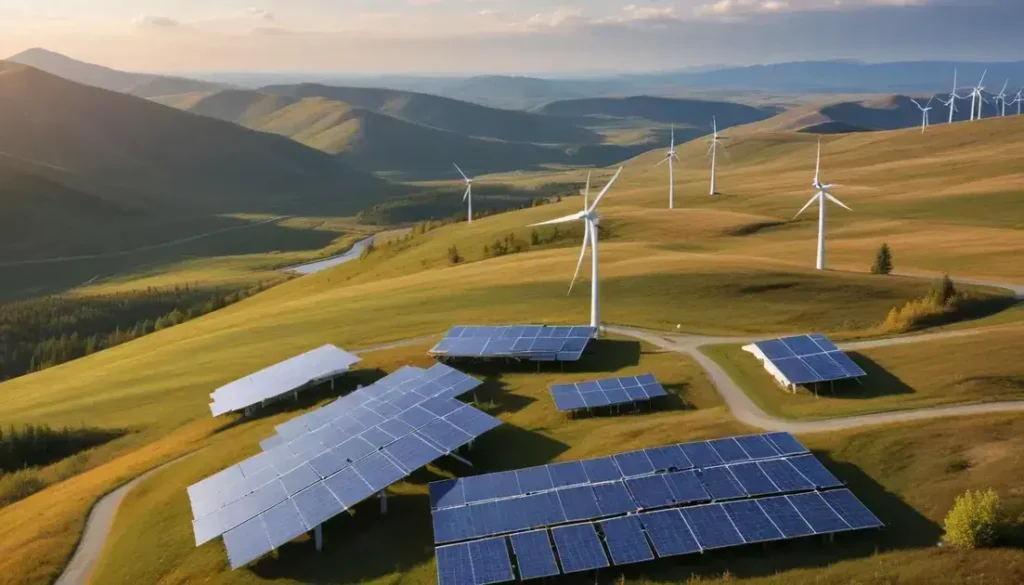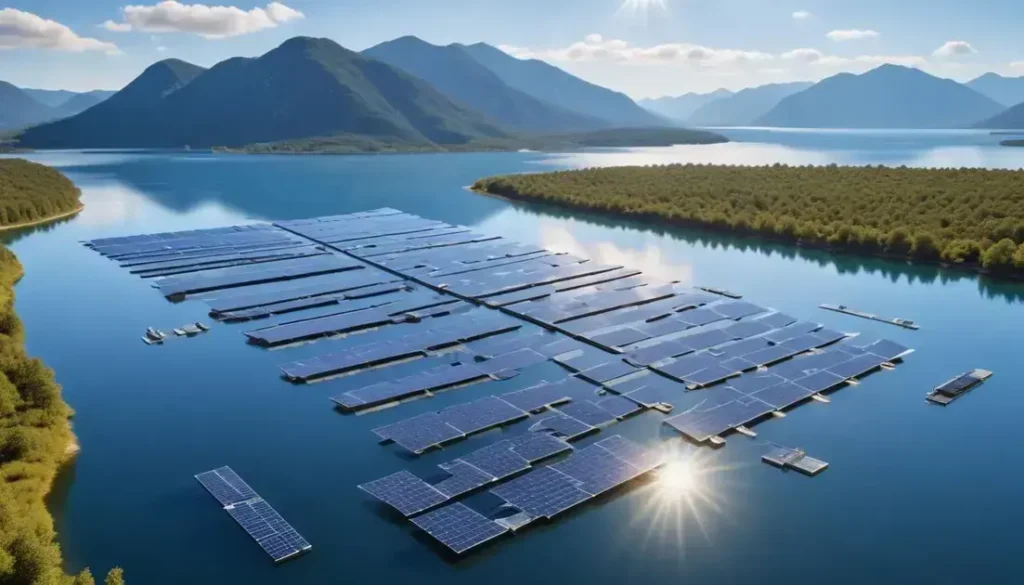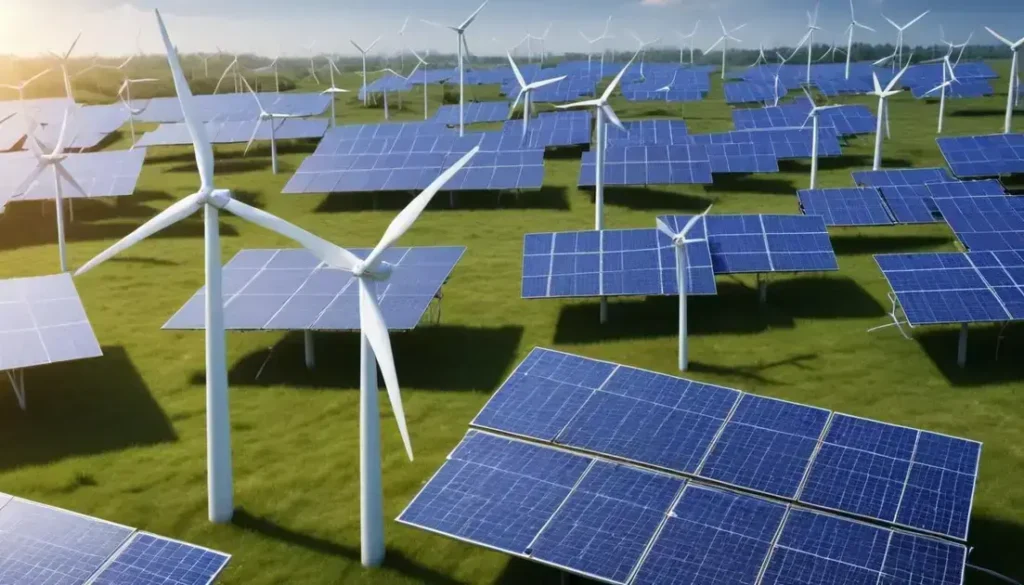Amazon is significantly investing in nuclear energy, particularly through small modular reactors (SMRs), to achieve sustainability goals, reduce carbon emissions, and enhance its operational efficiency while creating job opportunities in the emerging nuclear sector.
In an era where sustainability is paramount, **nuclear energy** is taking center stage. Amazon’s recent investments in this sector mark a significant shift, redefining clean energy strategies and their implications for businesses. Curious about how this affects the Canadian market? Let’s dive in!
Amazon’s $500 million nuclear commitment
Amazon’s significant investment of $500 million into nuclear energy highlights a pivotal moment in the tech giant’s commitment to sustainability. This funding is set to revolutionize the energy landscape, emphasizing the importance of clean energy solutions in reducing carbon emissions.
A major focus of this investment is the development of small modular reactors (SMRs). SMRs present a promising opportunity to provide safe, efficient, and scalable nuclear power. Their design allows for easier integration into existing energy systems, making them less disruptive while also reducing overall costs.
Additionally, Amazon’s partnership with Talen Energy aims to enhance the infrastructure required for these advancements. Such collaborations are essential for fostering innovation and developing nuclear solutions that are not only effective but also environmentally friendly, addressing growing concerns over traditional energy sources.
This move not only demonstrates Amazon’s dedication to sustainability but also signals a shift in the nuclear energy sector, appealing to a broader audience seeking reliable and low-impact energy alternatives. As Canada embraces cleaner technologies, the implications of Amazon’s investment could reverberate across the continent, potentially influencing Canadian businesses and their energy strategies.
The role of small modular reactors (SMRs)
Small Modular Reactors (SMRs) are poised to revolutionize the nuclear energy sector by providing an innovative solution to energy demands. These advanced reactors are designed to be smaller and more flexible than traditional nuclear plants, allowing for easier deployment in various settings, including remote areas and less densely populated regions.
One of the significant advantages of SMRs is their inherent safety features. Unlike larger reactors, they are designed to operate safely in a variety of scenarios, including natural disasters. This reliability is crucial for gaining public trust in nuclear energy, especially in regions sensitive to safety concerns.
Moreover, SMRs can be built in factories and shipped to installation sites, reducing construction time and costs. This modular approach simplifies the process of expanding energy capacity, making it attractive to utilities and investors who are hesitant to commit to large-scale nuclear projects.
The deployment of SMRs is expected to contribute significantly to Canada’s energy transition goals. By embracing this technology, Canada can enhance its energy security while minimizing greenhouse gas emissions. The adoption of SMRs aligns perfectly with the nation’s commitment to sustainability and innovation, paving the way for a greener future.
Partnership with Talen Energy
The partnership between Amazon and Talen Energy marks a strategic collaboration focused on advancing nuclear energy solutions. This alliance aims to leverage Talen Energy’s extensive experience in energy generation with Amazon’s commitment to sustainability. Together, they are working to develop nuclear power projects that utilize small modular reactors (SMRs) to meet energy demands.
Talen Energy is known for its innovative approach to energy production, focusing on reducing emissions while enhancing energy efficiency. By combining resources, the partnership is poised to accelerate the deployment of clean nuclear technologies, which are vital for achieving carbon reduction targets in the energy sector.
This collaboration also reflects a growing trend of companies seeking to diversify their energy sources. With nuclear power’s potential to provide reliable, low-carbon energy, Amazon acknowledges the necessity of integrating such resources to minimize its carbon footprint. As this partnership progresses, it could serve as a model for other companies looking to enhance their energy strategies.
Further, the partnership is expected to foster innovation within the nuclear sector. Both companies are committed to creating a framework that prioritizes safety, sustainability, and community engagement, setting a strong precedent for future nuclear projects across North America.
Impacts on AI infrastructure
The integration of nuclear energy solutions significantly impacts AI infrastructure, enhancing its reliability and efficiency. As companies like Amazon invest in clean energy, AI systems can access more stable power sources, vital for continuous operation and development. With a reduced carbon footprint, nuclear energy aligns well with the sustainability goals of AI-driven companies.
A stable energy supply is crucial for powering extensive data centres that support AI training and processing. Nuclear power provides a consistent output, ensuring that AI systems can function without interruptions. This is essential for real-time data analysis and machine learning applications, which require constant access to substantial computational resources.
Moreover, the use of small modular reactors (SMRs) can facilitate decentralized energy solutions. This approach enables AI infrastructure to be set up in remote areas, supporting innovations in less accessible regions. Such developments can lead to advancements in edge computing, where AI processing occurs closer to the data source, enhancing efficiency.
The collaboration between energy providers and technology firms is paving the way for smarter energy usage. By leveraging AI alongside nuclear energy, companies can optimize power consumption, resulting in reduced operational costs and enhanced environmental responsibility, driving both technological advancement and sustainability forward.
Economic benefits for Pennsylvania
The expansion of nuclear energy in Pennsylvania offers significant economic benefits for the state. As Amazon invests in this sector, the potential for job creation becomes evident. New nuclear facilities are expected to generate hundreds of direct and indirect jobs, spanning various fields such as engineering, construction, and maintenance.
Moreover, the introduction of small modular reactors (SMRs) creates a unique opportunity for Pennsylvania to position itself as a leader in the advanced energy market. This technology not only provides a reliable energy source but also attracts businesses looking for sustainable energy solutions.
As local economies thrive, the tax revenues generated from these projects can directly contribute to community services and infrastructure improvements. This influx of funds allows for enhancements in education, healthcare, and public safety, benefiting residents across the state.
The sustainability aspect of nuclear energy aligns with Pennsylvania’s environmental goals, appealing to businesses and consumers focused on reducing carbon footprints. Furthermore, the collaboration between tech companies and energy producers can lead to innovations, providing a competitive edge in the rapidly evolving energy landscape. By embracing nuclear power, Pennsylvania can stimulate its economy while advancing towards a cleaner, more sustainable future.
New nuclear projects in Washington and Virginia
Recent developments in nuclear projects in Washington and Virginia showcase a renewed commitment to clean energy and innovation. These states are embracing the potential of small modular reactors (SMRs), which provide a safer, flexible, and cost-effective approach to nuclear energy.
In Washington, the Tri-Cities area is becoming a hub for advanced nuclear technology. This region is home to several initiatives aimed at deploying SMRs, which can generate lower carbon emissions while meeting energy demands. Local partnerships with industries and government agencies are essential to drive these projects forward, creating new opportunities for job growth and technological advancement.
Similarly, Virginia is making strides with plans to integrate nuclear power into its energy portfolio. State officials recognize SMRs as a vital resource for achieving long-term sustainability goals. With regulatory support, Virginia aims to foster a conducive environment for investment in nuclear energy, which can lead to improved energy security and resilience.
The collaboration between public and private stakeholders in these states illustrates a forward-thinking approach to energy challenges. As Washington and Virginia invest in nuclear technologies, they set a precedent for others to follow, reinforcing the importance of nuclear energy in the future energy landscape across North America.
Job creation linked to nuclear energy
The expansion of nuclear energy significantly contributes to job creation across various sectors. As investments in nuclear facilities increase, so does the demand for skilled workers in engineering, construction, and maintenance roles. These positions are critical for the development and operation of advanced nuclear technologies, such as small modular reactors (SMRs).
In addition to direct job opportunities, nuclear energy projects also stimulate growth in related industries. Suppliers of materials, technology, and services see increased demand as new plants are built and existing facilities are upgraded. This ripple effect boosts the local economy and fosters community engagement.
Training programs and educational initiatives are essential components of this job growth. Many companies collaborate with local educational institutions to develop workforce training that prepares individuals for high-demand positions in the nuclear sector. By investing in human capital, the nuclear industry not only fills its own workforce needs but also enhances the employability of the community.
Furthermore, jobs linked to nuclear energy tend to provide competitive salaries and long-term career stability, attracting a diverse workforce. As the industry evolves, new roles in areas such as cybersecurity and data analysis are also emerging, broadening the scope of employment opportunities associated with nuclear energy.
Amazon’s future in sustainable energy
Amazon’s commitment to sustainable energy is a cornerstone of its long-term vision. With significant investments in nuclear energy and other renewable resources, Amazon aims to reshape its energy consumption patterns. By harnessing small modular reactors (SMRs) and other innovative technologies, the company is set to achieve a substantial reduction in its carbon footprint.
The integration of nuclear power plays a critical role in meeting Amazon’s energy demands efficiently and responsibly. Unlike traditional fossil fuels, nuclear energy offers a reliable source of low-emission power, crucial for powering vast data centres and logistics operations. This shift not only aligns with global sustainability goals but also enhances operational resilience.
Furthermore, Amazon is actively exploring partnerships with energy providers and technology firms to further advance its renewable energy initiatives. This collaborative approach allows for the sharing of expertise and resources, fostering innovation within the energy sector.
As part of its sustainability strategy, Amazon is also focusing on improving energy efficiency across its operations. Initiatives include upgrading facilities to utilize renewable energy sources optimally and researching advanced energy storage solutions. By combining cutting-edge technologies with sustainable practices, Amazon is positioning itself as a leader in eco-friendly energy usage.
In Conclusion
The journey towards a sustainable energy future is essential for companies like Amazon. By investing in innovative energy solutions such as nuclear power and small modular reactors, Amazon is setting an example for others to follow. These efforts not only reduce carbon emissions but also create job opportunities and enhance energy security.
As the demand for clean energy continues to grow, the collaboration between technology firms and energy providers will be crucial. Together, they can drive advancements in energy efficiency and sustainability, benefiting both businesses and communities.
Overall, embracing sustainable energy practices positions companies for long-term success in a rapidly changing world, reinforcing their commitment to environmental stewardship. With a proactive approach, Amazon and similar companies are paving the way for a greener, more sustainable future.
Frequently Asked Questions
What is Amazon’s commitment to sustainable energy?
Amazon is committed to investing in sustainable energy solutions, including nuclear power and small modular reactors, to reduce its carbon footprint and enhance energy security.
How does nuclear energy benefit the environment?
Nuclear energy provides a low-emission power source, which helps to significantly reduce greenhouse gas emissions compared to traditional fossil fuels.
What job opportunities arise from the nuclear energy sector?
The nuclear energy sector creates various jobs, including roles in engineering, construction, and maintenance, contributing to local economic growth.
How are small modular reactors (SMRs) different from traditional reactors?
SMRs are smaller, safer, and more flexible than traditional reactors, allowing for easier deployment and integration into existing energy systems.
What role does technology play in sustainable energy practices?
Technology enhances the efficiency of sustainable energy practices through innovations such as energy management systems and advanced data analytics.
Why is collaboration important in advancing sustainable energy?
Collaboration between companies in the energy and technology sectors fosters innovation, allowing for the development of new solutions that enhance energy efficiency and sustainability.


